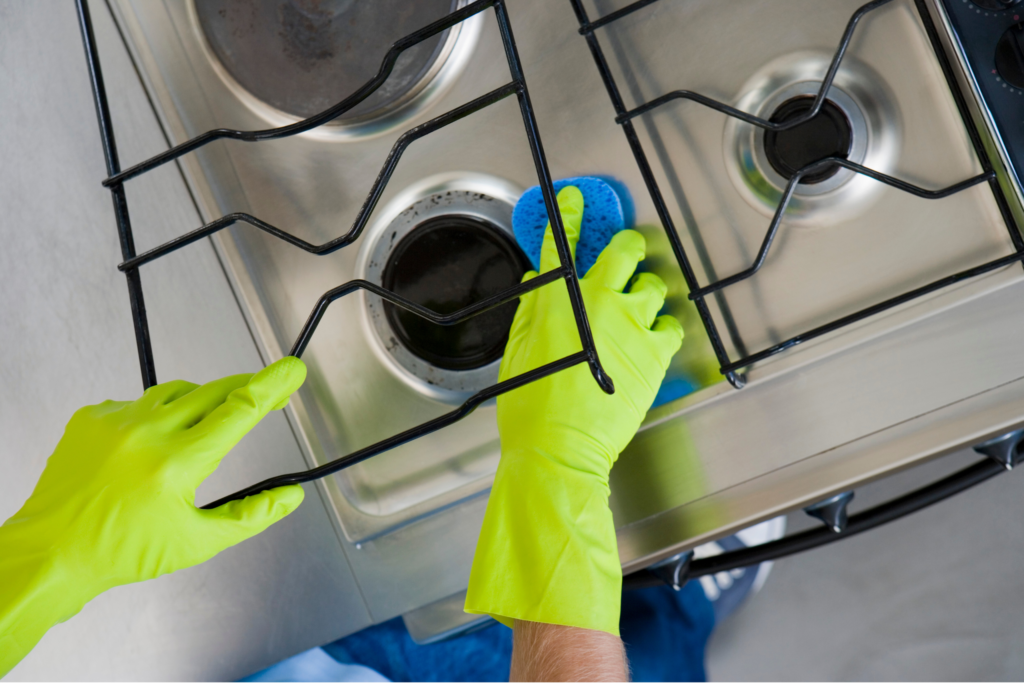I have a friend who routinely teases me (in a really fun way) about how I’m always cleaning my kitchen. She’s asked me several times about playing pickleball with her, and I’ve had to decline because I was cleaning my kitchen. Sometimes, she’ll call and ask what I’m doing, to which I reply, “Cleaning my kitchen.” She says that when she comes over for dinner, my kitchen will be so clean that she plans to eat off the floor!
I’m glad that she’s just teasing me because I don’t think my floors would be clean enough for eating purposes. Nevertheless, I’m very certain that whatever gets made on the stove will be safe to eat because I clean my stove with some rigorous attention to keeping it fresh. To this end, I usually dismantle the burners and soak them in the sink weekly, along with a deeper cleaning inside the stove to keep the drip pan less gross, along with trying to stay on top of the crumb accumulation.
I’m attentive to the inside of the stove because one time, I noticed that even though I’ve been conscientious about cleaning the burners, the inside of the stove was very no bueno and borderline disgusting. Consequently, I’m very committed to keeping the inside stove clean equally as much as the outside.
As I think about this idea of keeping the outside and inside clean, this reminds me of lots of clichés, such as:
- Don’t judge a book by its cover (unknown origin).
- All that glitters is not gold (Shakespeare).
- Don’t judge a day by its weather (Dick Van Dyke).
- Judging others makes us blind, whereas love is illumination (Bonhoeffer).
This whole inside and outside concept is something we must consider because it relates to the possibility of hypocrisy in our lives. And Jesus had some very choice words to say about hypocrisy, mostly aimed toward religious people. In Matthew 23, Jesus uses the term “hypocrites” eight times, and He’s not compassionate nor diplomatic. In this chapter, Jesus is taking to task the religious leaders of His day because of the gaping chasm between their words and their actions.
Maybe Jesus was most severe in calling out these religious leaders in Matthew 23:28 when He says, “So you, too, outwardly appear righteous to men, but inwardly you are full of hypocrisy and lawlessness.” When I read Jesus’ criticisms of the religious leaders in His day, it makes me catch my breath and forces me to pause and think about myself in terms of my external influence and my internal essence. I pause and ask myself about the discrepancies that might be present in what I say and how my external words might be incompatible with my interior.
With this in mind, let’s remember that it’s much easier to blow smoke and talk a big talk more than making our “talk” be consistent with our “walk.” I don’t want to be a person that has a refined and attractive exterior adorned with beautiful words and religious platitudes but very yucky on the inside. So I’ve found it helpful to be more honest and transparent about my interior struggles. Doing this empowers me to be less of a hypocrite and lots more compassionate in our human existence. Maybe in heaven, I will live in the full integration of being both beautiful and wholesome on the outside every bit as much as on the inside. Until then, I find myself asking for Holy Spirit’s help to live in truth, compassion, and genuine love. Feel free to join me in this adventure and take a hard pass on a life defined or described by hypocrisy!
And now I return to cleaning my kitchen . . .



